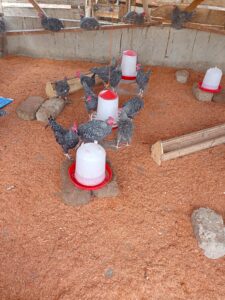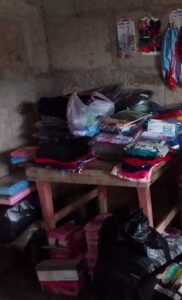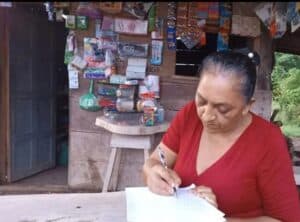It’s Not Easy, but it’s Worth It: Growing Orange-Fleshed Sweet Potato
By Patience Obour – Nutrition Program Officer

Elizabeth and her son, Derrick
Elizabeth, a mother of two from the village of Beposo in southern Ghana, joined Self-Help’s “Growing Healthy Food, Growing Healthy Children (GHFGHC)” maternal-child nutrition program when it first launched in 2018. Although she knew it was for children under the age of two and that her 18-month-old son, Derrick, would soon age out of the program, she was committed to learning as much as she could about proper nutrition to ensure a healthy diet for her children.
“I was very determined to improve both my life and the life of my kids,” Elizabeth shared, reflecting on the reason she became involved with the GHFGHC program.
By participating regularly in weekly training sessions, Elizabeth learned from Self-Help’s trainers about the importance of Vitamin A in children’s diets, and during the minor rainy season, July – mid-October, she observed other mothers in the program growing orange-fleshed sweet potato (OFSP). The vines were in short supply, so she was among the second group to be able to access the vines to grow OFSP on her own farm.
Difficult First Steps

Gathering OFSP
Elizabeth received her vines at the start of the dry season and was not be able to rely on rain water to grow her crops; instead, she had to transport water from a local river or stream by walking two-thirds of a mile each way from her farm to the river and carrying the heavy load of water back to her farm. Because of the difficulties transporting water, Elizabeth did not initially intend to plant any crops during the dry season; but after learning about the benefits of OFSP and receiving starter vines from Self-Help, she decided she would take on the challenge.
“Self-Help taught us mothers how to cultivate OFSP and supplied us with the vines to begin growing it. I was not sure this new crop was going to do well,” Elizabeth said. “We were told it needed water, especially during the first two weeks after cultivation. It was nearly the end of the rainy season when we learned this, and the rains had almost stopped coming in Beposo. I decided to give it a try anyway, and I dedicated time to watering my crop.”
Luckily, Elizabeth’s tireless efforts paid off.
“My dedication was not in vain because I have reaped the fruits of my labour. The crop did very well, and I started harvesting late December 2018,” Elizabeth said.
The Importance of Education

Elizabeth and OFSP
Providing education to increase knowledge is central to all of the programs at Self-Help International. Self-Help is constantly seeking ways to equip clients and partners with accurate and relevant information to help them make sound decisions to improve their lives. It is vital that the new information is able to be integrated in to the daily lives of Self-Help participants.
“Self-Help also taught us some OFSP recipes as hands-on practical training, so I already knew how to use the tubers before the crop was even ready for harvest,” Elizabeth shared. “My family really loves all the dishes prepared from OFSP, and my little boy really loves the chips and the OFSP leaves sauce.”
Reaping the Benefits
Elizabeth’s vines have continued to grow and are even extending into neighboring farms. She plans to cut some of her vines and share them with other mothers in the program and community members so they can also grow OFSP. She is continuing to share the benefits of her education and the OFSP itself.
“I am not the only one enjoying this harvest,” Elizabeth said. “I have given some to the other mothers who are part of the GHFGHC program to cook for their families.”

Elizabeth and her son, Derrick, enjoying the OFSP she has harvested
“As the popular saying goes ‘sharing is caring,’ and I strongly believe this is the reason why Self-Help supporters are also sharing with us: to make it possible for us to live a life with dignity. A very big thank you to all of Self-Help’s supporters. Your gifts are really going a long way to help us and our children,” Elizabeth added.
Elizabeth is an exemplary leader, both as a farmer and as a mother concerned with her children’s health. While her son, Derrick, has now aged out of the intensive first 1,000 days intervention, Elizabeth and Derrick still regularly attend training sessions, which are free to all of the community, so she can continue to learn about new ways to support her two children at home.




